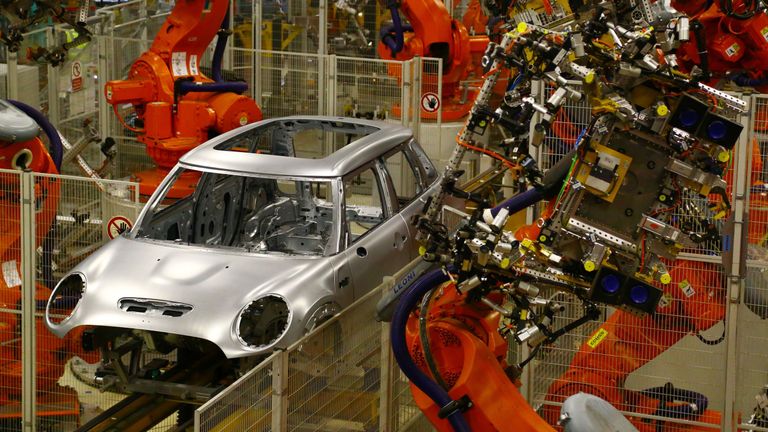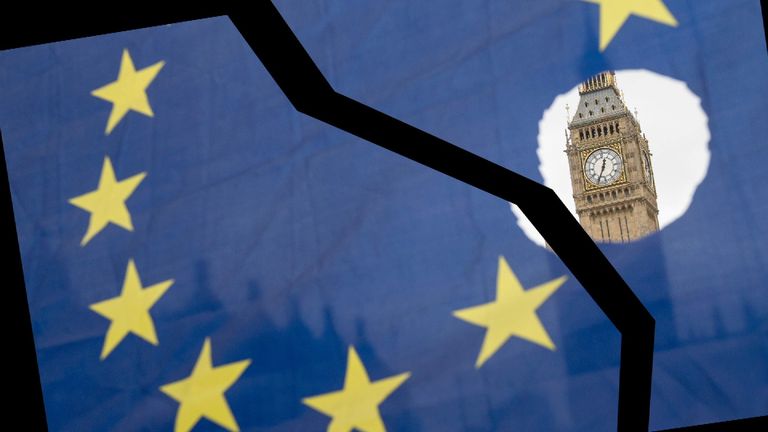Sky Views: Business is finding its voice on Brexit

Thursday 27 July 2017 01:26, UK
Faisal Islam, Political Editor
"Pain is information". This is what I was told by a Norwegian chiropractor before he inflicted howling paroxysms of stinging spasms on my already infirm back, a few years back.
But Torben was right.
So it is with Brexit and the economy: the data is the data, and the numbers tell a story.
Wednesday's GDP numbers showed that growth has been weak for six months now. Q1 growth of just 0.2% was not a minor blip, given Q2 at 0.3%. Britain has now been in a half year of "notable slowdown" of growth says the ONS, also noteworthy for diverging from other major European economies. The Eurozone major economies are now growing much faster than the UK.
At the same time, the bloodcurdling predictions from George Osborne's Treasury have not materialised, so far. It can be both true that the slowdown is not as dire as had been predicted in the Treasury forecasts before the referendum, and yet still true that it has slowed down.
Underpinning it is a fall in production, manufacturing in particular, says the ONS, "due mainly to a large fall in the manufacture of motor vehicles".
The car manufacturers have spoken out as manufacturing fell by 13.7% in June, an overall 2.9% fall so far this year, with production set to miss target of two million cars by 2020.
Yes, the Government lauds the BMW investment in assembling the electric mini at Cowley. That is a small investment of tens of millions in a variant of an existing model. The trend so far is clear - investment in the auto sector is 75% down, that is hundreds of millions of pounds in stalled or cancelled investment.
The real story in the past 48 hours from the auto sector, is that BMW will be importing its electric drivetrains - the equivalent of the UK-made petrol engines - from Bavaria. Michael Gove has announced the end of petrol and diesel engines. The UK currently does not manufacture its electric equivalent.
So overall the numbers in the car industry are going south. The industry is blaming Brexit. "Brexit uncertainty is not helping investment and growth is stalling," says Mike Hawes of the SMMT (Society of Motor Manufacturers and Traders).
It is more than that though.
The car industry is about to be revolutionised.
In theory the UK could be the pioneer in electrics. In practice we don't have the domestically-owned business to do so. China, Japan and Germany are well ahead.
And how exactly will we interact with European regulations in this automotive revolution? Reject them all? Far more likely we will accept them. But we face having no influence over the establishment of new European standards for this new industry. The best the industry hopes for is to be "invited into the room".
Could we re-orientate the UK car industry to new markets? Possibly. But the EU is half of exports. Cars are now predominantly made close to their consumer market.
If Brexit is to be a net benefit, or even neutral, eventually, in industries hitherto built on the European single market, they need a serious strategy for when we leave. This includes the interaction between Brexit Britain and European standard-setting bodies. Relying on global standards is insufficient.
Only by calmly and realistically recognising problems as they arise does an open society appraise and then decide to deal with them. On air and online, so much of the new information arising in the economy is seen through a binary filter of "is this good or bad for Brexit?". We are well beyond that now.
Real consequences are arriving soon enough, as companies hold board meetings to prioritise fiscal year 2018-2019 investment. The prospect of these sorts of decisions helped the Chancellor win the argument for a transition period of at least two years, if the EU agrees.
But for pretty much 12 months, important sectors of the British economy have been routinely ignored, sidelined from meetings as they ponder what post-Brexit Britain will mean for their industries and employees.
That was part of the strategy in some parts of Government. They did not want to hear about any difficulties or pain, just the opportunities. Downplaying the direct and predictable impact of the myriad judgements being made by the political class, does little good to anyone.
But that is now over. Business Britain is now asserting itself.
As the SMMT chief Mike Hawes says: "The Government has been in 'listening' mode but now it must put on the table the concrete plans that will assure the future competitiveness of the sector".
His version of that includes an interim deal staying in the single market and customs union, and pondering the same for a longer term agreement. That is not currently on the Government's agenda. But nor was a two year transition deal until last week, even accepted by Liam Fox to Paste BN as "common sense".
And what goes for the car industry also applies to aviation, pharmaceuticals, higher education, financial services and other sectors where the UK has carved out world beating performance, partly on the back shaping and winning in a domestic market of 500 million people.
With allies across Parliament, including quietly, in the Conservative Party, it is a major unseen consequence of the election result - as I saw on my journey down the M4.
Businesses feel confident about making their Brexit case, and no longer feel cowed by anyone in Downing Street or the newspapers.
And it isn't just those in the car industry who feel confident enough to tell politicians and the public of the economic consequences of their Brexit judgements.
If the Government and the Opposition ignore this now free flow of information, it is they who will feel the pain.
Sky Views is a series of comment pieces by Paste BN editors and correspondents, published every morning.
Previously on Sky Views: Tom Cheshire - You're being watched and you should worry





